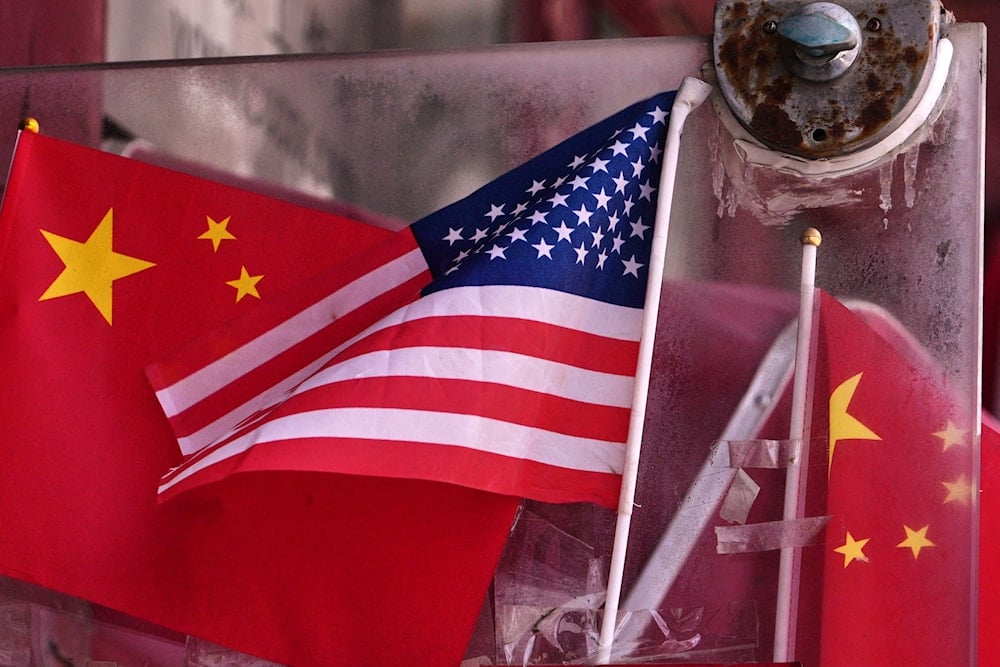Tariffs won't sway US allies against China: Bloomberg
A new Bloomberg report highlights how the United States' current approach to the trade war is destined for failure, emphasizing all the alternative measures that would be effective.
-

China and US national flags are seen on display on an entrance door of a souvenir shop in Beijing on April 3, 2025. (AP)
A new Bloomberg report highlighted that the US needs allies to counter Chinese mercantilism, and using tariff threats as leverage is the wrong approach to win their cooperation.
According to the report, Treasury Secretary Scott Bessent framed the White House’s aggressive trade policies as a deliberate strategy: first, renegotiating terms with allies, then uniting them to demand concessions from China.
The Bloomberg report highlighted that while countries are eager to avoid the looming threat of "reciprocal" tariffs, which have been temporarily suspended until July, this does not necessarily translate into a willingness to align with a US-led effort to isolate China, according to the report.
A clash of goals
The report highlighted that smaller nations, for whom China is often the largest trading partner, cannot risk severing such critical economic ties, while the European Union and other major economies remain reluctant to destabilize the rules-based trading system, a framework that even Chinese officials claim to uphold.
Key trading partners remain hesitant to join US trade efforts against China given the unpredictability of Washington's policy shifts, with the administration already showing signs of softening its stance amid market turmoil and fierce backlash from American business leaders, according to Bloomberg.
The White House’s erratic trade strategy has left potential allies wary, not only due to fears of alienating China, their largest trading partner, but also because Washington’s ever-shifting justifications for tariffs have created confusion rather than coalition-building.
With the administration already wavering under market pressure and corporate backlash, partners see little reason to join an ill-defined crusade, especially when undermining the rules-based order risks collateral damage for economies that, unlike the US, can’t afford trade volatility.
A more effective approach would focus narrowly on shared concerns rather than this scattershot agenda, the report noted. The most critical shared vulnerability remains dependence on Chinese supplies for essential goods, from rare earth metals to pharmaceutical ingredients.
Despite recognizing their supply chain vulnerabilities since COVID-19's disruptions, nations have made little progress in establishing alternatives, creating an opportunity for the US to lead collaborative efforts that leverage allies' specialized capabilities rather than pursuing unrealistic domestic reshoring of all production.
Any protective tariffs should be narrowly targeted at industries with genuine national security implications, not indiscriminately applied across all sectors from automobiles to footwear, which Trump is doing.
As per Bloomberg, America’s allies share Washington’s frustration with China’s systematic circumvention of its WTO commitments, if not through outright violations, then through subversion of the trade body’s principles, yet they remain unconvinced by the administration’s confrontational approach.
Instead, a better method would be using established WTO mechanisms like anti-dumping investigations to counter Beijing’s unfair subsidies, which could build multilateral pressure for meaningful concessions such as negotiated export restraints rather than provoking retaliatory spirals through unilateral tariffs.
Balancing trade tensions strategically
The report goes on to highlight that the White House should understand that criticizing China and pressuring allies will not automatically bring factories back to America, since what manufacturers truly need are stable trade policies along with serious investments in education, research, and workforce development.
The US must also streamline regulations, address its fiscal challenges, and remain open to skilled immigrants. Simply relying on protectionist measures will fail without fixing these fundamental weaknesses in competitiveness.
On the other hand, China would benefit from matching any US de-escalation efforts, since the prolonged absence of high-level dialogue creates a vacuum increasingly filled by hardline factions, raising the risk of more aggressive measures such as investment blacklists, technology export limitations, visa denials, or even financial sanctions targeting Chinese-owned US Treasury assets.
The consequences of such measures would be difficult to reverse, with any missteps carrying dangerous risks; whether sudden Chinese pressure on Taiwan or abrupt US restrictions on key technology exports could be misread as escalatory actions, underscoring why Washington must maintain dialogue with Beijing even while building alliances.

 4 Min Read
4 Min Read








